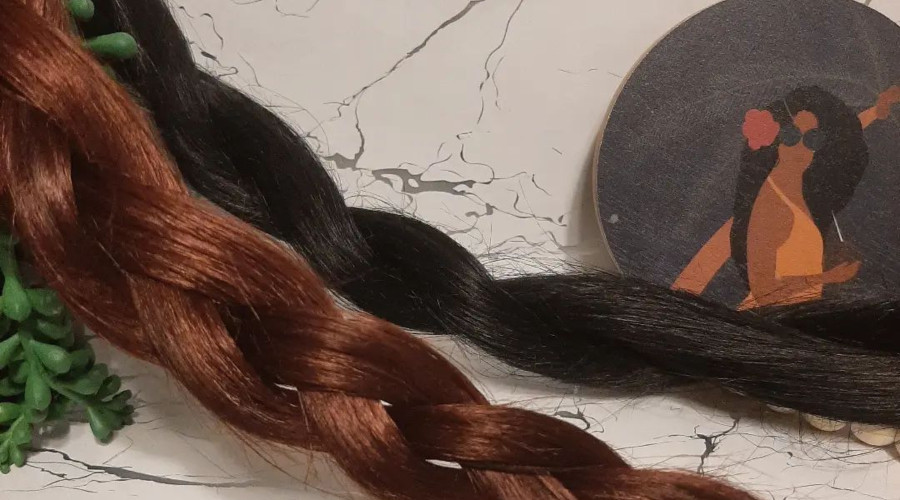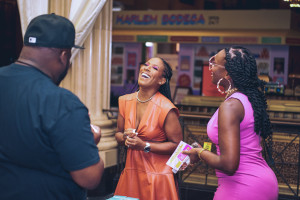Seyi Adaghe is tackling this head-on by creating plant-based eco-friendly braiding hair and a recycling program for synthetic hair to allow people to still look fly while protecting the planet.
Seyi grew up getting her hair braided in various cornrow styles. “On special occasions like Christmas or family vacations, I’d step it up by adorning the ends of my cornrows with beads or getting long braids with hair extensions. When my family moved to Canada, I started doing both mine and my mom’s hair myself – I learned how to do natural hairstyles like twist outs, install sew-in weaves, and use braiding hair and crochet extensions.”
In 2020, Seyi was discussing the difference in braiding hair access within the US and Canada with a friend. As they exchanged frustrations, she contemplated opening an online hair extension supply business. As she completed her Master’s in Environment and Business and worked toward a career in Corporate Sustainability she grew to hate the idea of selling synthetic hair. “I wanted whatever I offered to be environmentally friendly, or at least offer a way for people to not create more plastic waste from the use of synthetic hair. I decided to put a pin on the idea. A few weeks later, I came across a video that blew my mind and inspired me to create my own brand of braiding hair extensions that was better for both the environment and the user.”
Through her own research, Seyi has learned about how harmful synthetic hair truly is. “I’ve learned that synthetic hair is made from a blend of petroleum-based plastic polymers, like acrylic, nylon, and polyester. It has a complicated production process which makes use of harmful and toxic chemicals.”
She adds that one of the ways that synthetic hair is harmful to the planet is at the end of its life cycle.”It is designed to be single-use, so it primarily ends up in landfill after disposal. At landfill sites, synthetic hair waste may be incinerated which releases harmful gases that contribute to global warming. In cases where synthetic hair waste is not incinerated, because it is made from plastic which does not biodegrade, it only breaks down into tiny particles over several years. These microplastic particles easily run off when it rains and settle into natural water systems – like rivers and oceans, affecting aquatic life and accumulating in the bodies of seafood that we eat. From global warming to water pollution and food contamination, synthetic hair causes more harm than good to the environment, which ultimately ends up harming us as people.”
{https://www.instagram.com/p/CqV4iDTt7ic/}
Seyi founded RÓUN Beauty based on two principles: reducing the use of synthetic hair and diverting synthetic hair waste from landfills. “We recognized that despite the increased demand for more natural and eco-friendly hair care products in the last several years, there has been little to no innovation with respect to hair extensions. RÓUN Beauty is working to fill this gap with our plant-based braiding hair extensions, which is in its final stage of development and will launch soon.” Made from biodegradable plant fibres and free of toxic chemical additives that typically cause scalp irritation and itching discomfort to synthetic hair users, RÓUN Beauty provides braid lovers with a sustainable alternative, so they no longer have to choose between beauty, the environment, or their comfort.
RÓUN Beauty has created a recycling project, “Recycle with RÓUN” to collect and divert all kinds of synthetic hair extensions from landfill. “People can mail us their used or leftover synthetic hair after they are done with their styles or drop it off at our booth when we’re in their community for pop-up or showcase events. We typically post when we’re going to be in a city on our Instagram page. Through organizations we partner with, the synthetic hair waste we collect is repurposed to create value, such as construction fillers and energy that can be fed into the power grid."
From surveys and pop-up prototype showcases RÓUN Beauty has done in the last few months, they have received lots of positive interest and feedback from potential consumers. The concept of plant-based hair extensions is largely unheard of, and their work is often met with a great level of excitement and questions. “Overall, the majority of people we engage with say they can’t wait for our launch and subscribe to our email list for updates. One person we engaged with described our product as something they’ve been looking for but didn’t realize they needed. We’ve been fortunate to receive this kind of response and support from consumers and industry partners alike, and we expect to receive more interest as awareness of our brand and product grows in the market!”
In addition to being biodegradable, RÓUN Beauty’s plant-based braiding hair extensions come pre-stretched, itch-free, and enriched with ingredients that help moisturize the user’s hair strands. Their braiding hair will be made here in Canada and be available in a few popular colours, with the option for a colour customization service. “As we hear from our customers on their colour preferences, we will add more selections to the standard offering. Our first braiding hair product will come in a smooth silky texture for common braid and twist styles. We’d love to offer curly and kinky textures in the near future, so we’re researching ways to make this happen!”
Seyi hopes that hair care and styling practices, in all their forms, will no longer come at a hidden cost to our health or the planet. “For too long, we (Black women in particular) have normalized the scalp irritation and casually dismissed the negative environmental impacts of products like synthetic hair. I recognize that due to the social and economic challenges and inequalities, we wrestle with daily, our choices often feel limited. My hope for our future is that caring for ourselves with high quality and eco-friendly products that are better for us would no longer be, or feel like, a privilege that only a few can afford.”

 By
By 





